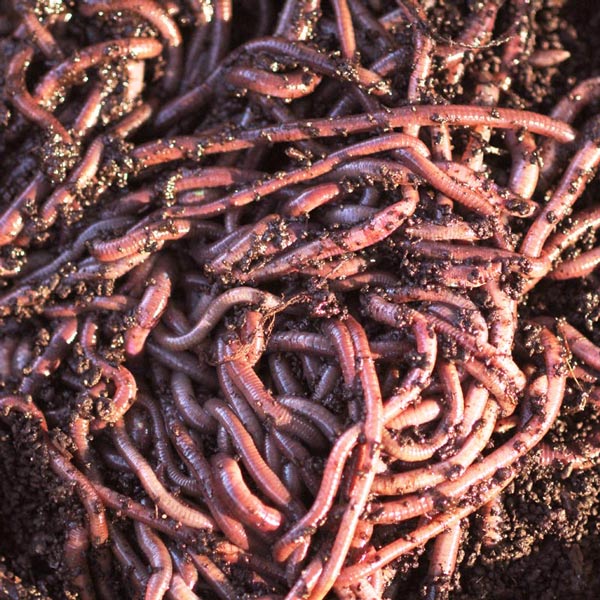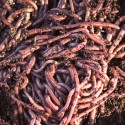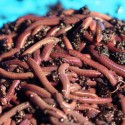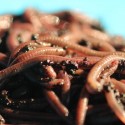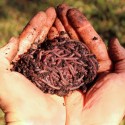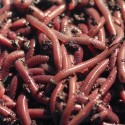Overview
The African Nightcrawler is known for its size and appetite. This tropical worm species tolerates higher temperatures than its composting cousins. The African Nightcrawler has a uniform purple-gray sheen and the posterior segments are evenly tapered to a point. It can grow over 6 inches in length and is the largest composting worm . The dark, nutrient-rich vermicompost created by this earthworm is prized among organic gardeners. You can feed Africans your kitchen scraps, farm manure as well as grains formulated for worms. You will be amazed at how fast they can grow and produce worm castings. They breed quickly and can consume large amounts of organic material -- the larger the worm, the more it can eat! The African Nightcrawler will thrive in a habitat temperature of 75-86°F.Habitat Recommendations
For 5 pounds of African Nightcrawlers, you can utilize any of the following containers:- 17 gallon storage tote, minimum
- Minimum container dimensions: 27.0" L x 18" W x 12" H
- Worm Factory, 5 tray minimum
- Three 5 gallon bucket
- *Manure pile
- *Compost pile
- Freezer or bathtub
*Africans cannot survive in an environment that is below 50°F. Keep this in mind when adding to any outdoor manure or compost piles.
Bedding Recommendations
Africans Nightcrawlers can live in several different types of bedding. You can mix and match at your convenience:- *Composted manure
- Coconut coir
- Shredded newspaper
- Mushroom compost
- Shredded brown cardboard
- *Peat Moss
*Horse and cow manure MUST be thoroughly composted before
using, at least 4-6 weeks. If using rabbit manure be sure to hose down
thoroughly if you are sourcing from directly under rabbit hutches due to
possible high urine saturation.
*Peat moss may be too acidic which can cause the Africans escape
your habitat. The low pH depends entirely on where the peat is
harvested. Be sure to soak peat for 48 hours before using -- this helps
to raise the pH. You can also add garden lime (calcium carbonate) to
raise the pH.
Feeding Tips
Your Africans can eat just about everything you can! However, you should stay away from meat and fried food. Meat smells horribly when it decomposes and fried food doesn't break down properly, so your worms won't be able to eat it.What amount of kitchen scraps should you feed 5 pounds of African Nightcrawlers?
There isn't really a need to get scientific and measure everything out
-- use the size of your hand making a fist as your measuring tool. For 1 pound of Africans, begin feeding with 4 fist-sized
portions of kitchen scraps. Depending on the state of decomposition, it
will take anywhere between 1-3 weeks for those scraps to be consumed.
When the food has almost disappeared, repeat with four fist-sized
portions. As time goes by, you will begin to recognize how long it
takes different types of food to be consumed and if any adjustments need
to be made.
How much specially formulated grain feed should you feed 5 pound of African Nightcrawlers?
There are two feeding methods for grain feeding; 1) top feeding and 2) total mix feeding.
For top feeding, begin with 2/3 cup of grain even sprinkle on the top of the bedding, then mist with water to soften the feed. Do not feed again until ALL of the grain has been consumed. This will take anywhere between 12 to 36 hours. If the feed is consumed in less than 12 hours you can increase the amount. If it takes longer than 36 hours, decrease the amount. Add 2 inches of bedding every 2 weeks to keep your bedding fresh.
For total mix feeding, add 1/4 cup of feed per 1 gallon of
bedding and thoroughly mix. Make extra bedding/feed mix to continue
feeding when the worms have consumed the grain. The mixed-in feed
should satisfy the worms for about 3 weeks. After 3 weeks, add 1 inch
of the extra bedding/feed mix to the top of your habitat bedding.
Good to Know's
- African nightcrawlers are sensitive to low pH levels. If you choose to raise them having a pH meter will be handy.
- Keep the bedding as fresh as you can. African Nightcrawlers will reject bedding that has too high a ratio of worm castings to bedding
- African
Nightcrawlers are prone to "running" more than the other composting
species. However they do not do so without reason. If your Africans
begin to leave your habitat you may need to raise the pH or complete a
bedding change.
- If you are going to give your African Nightcrawlers a grain-only diet you will need to closely monitor your habitat for signs of overfeeding (or underfeeding). Overfeeding will leave too much uneaten food in the bedding and turn it sour and acidic due to grain fermentation. Underfeeding will cause the worms to leave the habitat in search of more food.
- 5 LBS of Africans Nightcrawlers is a large amount of worms for a portable habitat and, for optimal reproduction rates, you should change your bedding at least every 5 weeks.
- As the population grows you should consider splitting the colony into two habitats. If you don't split, to keep the Africans happy, you will need to refresh the bedding more often in order to keep up with the increase in castings production.





